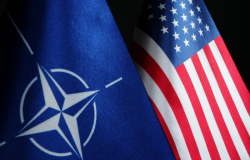Shutterstock/Alexander Lukatskiy
Britain Alone: The Path from Suez to Brexit | A Discussion with Philip Stephens
Overview
Britain Alone is a story of a nation's attempt to reconcile its past and present in a confident national identity—in the description of the American statesman Dean Acheson, to find a role after the end of empire. It is a story of inflated ambition rubbing up against its diminished circumstance, of a glorious past and an unforgiving present, and ultimately of Britain’s effort over many decades to come to terms with its place as an important, but second rank power. It's a story that touches at every turn neuralgic issues of national pride, identity and history.
The book’s account of this quest for a post-imperial role presents the canvas for first the calamity of Anthony Eden’s Suez expedition and then, sixty years later, for the decision to leave the European Union. Suez and Brexit spoke to the past it could not leave behind.
Join us for a conversation with Philip Stephens and Michelle Egan to discuss his new book, available now.
Philip Stephens is an award-winning journalist and chief political commentator at the Financial Times. He was previously director of the FT’s editorial board. Throughout his career, he has had unique access to foreign policymakers in Britain and around the world. Stephens won the David Watt Prize for Outstanding Political Journalism; the UK Political Studies Association’s Political Journalist of the Year; and Political Journalist of the Yar in the British Press Awards. He is the author of Britain Alone, Politics and the Pound, and Tony Blair.
Speaker
Hosted By

Global Europe Program
The Global Europe Program is focused on Europe’s capabilities, and how it engages on critical global issues. We investigate European approaches to critical global issues. We examine Europe’s relations with Russia and Eurasia, China and the Indo-Pacific, the Middle East and Africa. Our initiatives include “Ukraine in Europe” – an examination of what it will take to make Ukraine’s European future a reality. But we also examine the role of NATO, the European Union and the OSCE, Europe’s energy security, transatlantic trade disputes, and challenges to democracy. The Global Europe Program’s staff, scholars-in-residence, and Global Fellows participate in seminars, policy study groups, and international conferences to provide analytical recommendations to policy makers and the media. Read more
Thank you for your interest in this event. Please send any feedback or questions to our Events staff.














